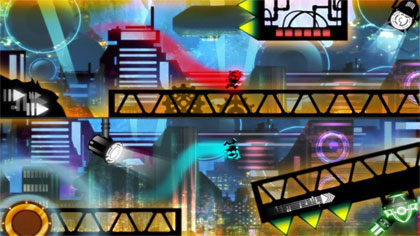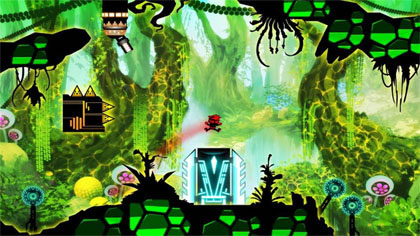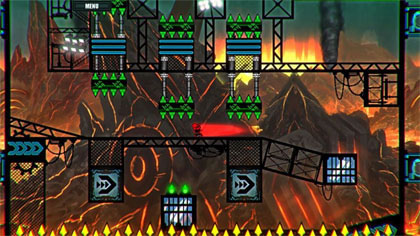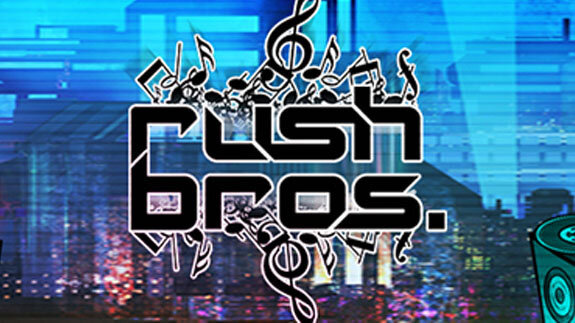- CLASSIC MAGAZINES
- REVIEW CREW
A show recapping what critics thought back
when classic games first came out! - NEXT GENERATION'S BEST & WORST
From the worst 1-star reviews to the best
5-stars can offer, this is Next Generation! - NINTENDO POWER (ARCHIVE)
Experience a variety of shows looking at the
often baffling history of Nintendo Power! - MAGAZINE RETROSPECTIVE
We're looking at the absolutely true history of
some of the most iconic game magazines ever! - SUPER PLAY'S TOP 600
The longest and most ambitious Super NES
countdown on the internet! - THEY SAID WHAT?
Debunking predictions and gossip found
in classic video game magazines! - NEXT GENERATION UNCOVERED
Cyril is back in this spin-off series, featuring the
cover critic review the art of Next Generation! - HARDCORE GAMER MAGAZING (PDF ISSUES)
Download all 36 issues of Hardcore Gamer
Magazine and relive the fun in PDF form!
- REVIEW CREW
- ELECTRONIC GAMING MONTHLY
- ELECTRONIC GAMING MONTHLY RANKS
From Mario to Sonic to Street Fighter, EGM
ranks classic game franchises and consoles! - ELECTRONIC GAMING MONTHLY BEST & WORST
Counting down EGM’s best and worst reviews
going year by year, from 1989 – 2009! - ELECTRONIC GAMING BEST & WORST AWARDS
11-part video series chronicling the ups and
downs of EGM’s Best & Worst Awards!
- ELECTRONIC GAMING MONTHLY RANKS
- GAME HISTORY
- GAME OVER: STORY BREAKDOWNS
Long-running series breaking down game
stories and analyzing their endings! - A BRIEF HISTORY OF GAMING w/ [NAME HERE]
Real history presented in a fun and pithy
format from a variety of game historians! - THE BLACK SHEEP
A series looking back at the black sheep
entries in popular game franchises! - INSTANT EXPERT
Everything you could possibly want to know
about a wide variety of gaming topics! - FREEZE FRAME
When something familiar happens in the games
industry, we're there to take a picture! - I'VE GOT YOUR NUMBER
Learn real video game history through a series
of number-themed episodes, starting at zero! - GREAT MOMENTS IN BAD ACTING
A joyous celebration of some of gaming's
absolute worst voice acting!
- GAME OVER: STORY BREAKDOWNS
- POPULAR SHOWS
- DG NEWS w/ LORNE RISELEY
Newsman Lorne Riseley hosts a regular
series looking at the hottest gaming news! - REVIEW REWIND
Cyril replays a game he reviewed 10+ years
ago to see if he got it right or wrong! - ON-RUNNING FEUDS
Defunct Games' longest-running show, with
editorials, observations and other fun oddities! - DEFUNCT GAMES QUIZ (ARCHIVE)
From online quizzes to game shows, we're
putting your video game knowledge to the test!- QUIZ: ONLINE PASS
Take a weekly quiz to see how well you know
the news and current gaming events! - QUIZ: KNOW THE GAME
One-on-one quiz show where contestants
find out if they actually know classic games! - QUIZ: THE LEADERBOARD
Can you guess the game based on the classic
review? Find out with The Leaderboard!
- QUIZ: ONLINE PASS
- DEFUNCT GAMES VS.
Cyril and the Defunct Games staff isn't afraid
to choose their favorite games and more! - CYRIL READS WORLDS OF POWER
Defunct Games recreates classic game
novelizations through the audio book format!
- DG NEWS w/ LORNE RISELEY
- COMEDY
- GAME EXPECTANCY
How long will your favorite hero live? We crunch
the numbers in this series about dying! - VIDEO GAME ADVICE
Famous game characters answer real personal
advice questions with a humorous slant! - FAKE GAMES: GUERILLA SCRAPBOOK
A long-running series about fake games and
the people who love them (covers included)! - WORST GAME EVER
A contest that attempts to create the worst
video game ever made, complete with covers! - LEVEL 1 STORIES
Literature based on the first stages of some
of your favorite classic video games! - THE COVER CRITIC
One of Defunct Games' earliest shows, Cover
Critic digs up some of the worst box art ever! - COMMERCIAL BREAK
Take a trip through some of the best and
worst video game advertisements of all time! - COMIC BOOK MODS
You've never seen comics like this before.
A curious mix of rewritten video game comics!
- GAME EXPECTANCY
- SERIES ARCHIVE
- NINTENDO SWITCH ONLINE ARCHIVE
A regularly-updated list of every Nintendo
Switch Online release, plus links to review! - PLAYSTATION PLUS CLASSIC ARCHIVE
A comprehensive list of every PlayStation
Plus classic release, including links! - RETRO-BIT PUBLISHING ARCHIVE
A regularly-updated list of every Retro-Bit
game released! - REVIEW MARATHONS w/ ADAM WALLACE
Join critic Adam Wallace as he takes us on a
classic review marathon with different themes!- DEFUNCT GAMES GOLF CLUB
Adam Wallace takes to the links to slice his way
through 72 classic golf game reviews! - 007 IN PIXELS
Adam Wallace takes on the world's greatest spy
as he reviews 15 weeks of James Bond games! - A SALUTE TO VAMPIRES
Adam Wallace is sinking his teeth into a series
covering Castlevania, BloodRayne and more! - CAPCOM'S CURSE
Adam Wallace is celebrating 13 days of Halloween
with a line-up of Capcom's scariest games! - THE FALL OF SUPERMAN
Adam Wallace is a man of steel for playing
some of the absolute worst Superman games! - THE 31 GAMES OF HALLOWEEN
Adam Wallace spends every day of October afraid
as he reviews some of the scariest games ever! - 12 WEEKS OF STAR TREK
Adam Wallace boldly goes where no critic has
gone before in this Star Trek marathon!
- DEFUNCT GAMES GOLF CLUB
- DAYS OF CHRISTMAS (ARCHIVE)
Annual holiday series with themed-episodes
that date all the way back to 2001!- 2015: 30 Ridiculous Retro Rumors
- 2014: 29 Magazines of Christmas
- 2013: 29 Questionable Power-Ups of Christmas
- 2012: 34 Theme Songs of Christmas
- 2011: 32 Game Endings of Christmas
- 2010: 31 Bonus Levels of Christmas
- 2009: 30 Genres of Christmas
- 2008: 29 Controls of Christmas
- 2007: 34 Cliches of Christmas
- 2006: 33 Consoles of Christmas
- 2005: 32 Articles of Christmas
- 2004: 31 Websites of Christmas
- 2003: 29 Issues of Christmas
- 2002: 28 Years of Christmas
- 2001: 33 Days of Christmas
- NINTENDO SWITCH ONLINE ARCHIVE
- REVIEW ARCHIVE
- FULL ARCHIVE
Rush Bros.
Back in a simpler time, there was a 16-bit game called Dashin' Desperadoes. Developed by Data East and released on the Genesis, this action game featured two cowboys embroiled in an epic footrace. Across multiple levels, these two cowboys did everything in their power to get to the finish line first, including sabotaging the other player.
Over the last two decades, I have been pleading with developers to come up with a next-generation version of Dashin' Desperadoes. The classic 16-bitter not only worked as a solid racing game, but also a fun platformer. It combined two genres into an irresistible mash-up, and it always seemed poised for a comeback. At least, that's what I thought before I played Rush Bros.

Dubbed a "music reactive side-scrolling platformer," Rush Bros. is the next-generation iteration of Dashin' Desperadoes. You take control of a DJ who is on a footrace against a competing DJ. Through more than 40 stages, players test their skills racing through harrowing platforming sections to find the finish line. Can you do this before the other DJ? I hope so, because the second-place player is blown up at the end of the match.
At first glance, Rush Bros. looks and feels a lot like many other recent 2D platformers, such as Super Meat Boy or N+. The controls are tight, developed with pinpoint-accurate jumps in mind. Our DJ hero is also able to jump off of walls and perform a slide for a boost in speed. Outside of picking up power-up items and occasionally pulling levels to open doors, there isn't much else to Rush Bros. gameplay.
The concept is the same for every level: Get to the finish line before the other person. If you don't have a second person, the goal is to better your previous time and memorize the increasingly complicated stage designs. Our DJ hero will face a lot of familiar platforming obstacles, like deadly spikes and bottomless pits. Some of the more dangerous objects react to the beat of the songs, a unique gimmick that is only hinted at in Rush Bros.

Although the concept is simple, there's a surprising amount of variety in the 40+ stages. The game starts out with a number of simple stages, the type of thing that eases the player into wall jumping and avoiding the various obstacles. Before long we're racing through a forest and frantically picking up keys to unlock doors. Another stage is set in a neon town, forcing players to find the right power-ups to complete the harrowing platform puzzles. And don't look now, because you'll see a number of stages intended to play homage to games like Super Mario Bros. and Sonic the Hedgehog.
While some of these stages are admittedly exciting to race through, their novelty runs out after the first or second attempt. Because they never change in any fundamental way, I found replaying stages to be an unfulfilling endeavor. Things get even worse when you play these stages online. Rush Bros. is the type of game that is almost impossible to balance, as one of the players will inevitably know the course better than the other.
The game seems keenly aware of the balance issues, as there are power-ups littering the stages. Some of these items help the player, such as double jump and a speed boost. However, there are a few items that are intended to hurt your opponent, including one that reverses the other player's controls and yet another that slows the action down. Unfortunately, these items often have an unexpected consequence. Instead of helping the player who has fallen behind, these items often allow the race leader to quickly propel themselves even further ahead.

Many of the later maps hint at ways Rush Bros. could improve the replay value. For starters, it would have been nice if there were multiple paths to the goal. It would have been nice if each stage randomly changed with each replay, forcing veterans racers to think on their feet. This may not completely balance the multiplayer mode, but it would go a long way to help. With a few more players at once and better item placement, Rush Bros. might actually be competitive, no matter where your skill level sits.
In an attempt to mask the lack of replay, the game screams overwhelming techno music at you from start to finish. The songs included aren't bad, but I quickly grew bored of hearing them repeat. Thankfully the game allows for custom soundtracks, saving me from the headache that is the rave. Sadly, adding your own music does not change the stage in any memorable ways.
Even though Rush Bros. does not quite achieve its full potential, it does have a lot of content to see and a great visual style. With a few changes, this little platformer could turn into a truly great competitive racing game. All of the elements are there; they just need to figure out how to balance the experience for everybody. If they can do that, then Rush Bros. will be a series worth paying attention to.
HOME |
CONTACT |
NOW HIRING |
WHAT IS DEFUNCT GAMES? |
NINTENDO SWITCH ONLINE |
RETRO-BIT PUBLISHING
Retro-Bit |
Switch Planet |
The Halcyon Show |
Same Name, Different Game |
Dragnix |
Press the Buttons
Game Zone Online | Hardcore Gamer | The Dreamcast Junkyard | Video Game Blogger
Dr Strife | Games For Lunch | Mondo Cool Cast | Boxed Pixels | Sega CD Universe | Gaming Trend
Game Zone Online | Hardcore Gamer | The Dreamcast Junkyard | Video Game Blogger
Dr Strife | Games For Lunch | Mondo Cool Cast | Boxed Pixels | Sega CD Universe | Gaming Trend
Copyright © 2001-2025 Defunct Games
All rights reserved. All trademarks are properties of their respective owners.
All rights reserved. All trademarks are properties of their respective owners.





























